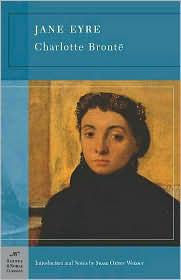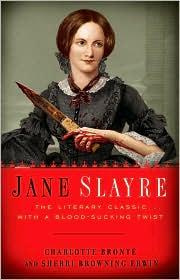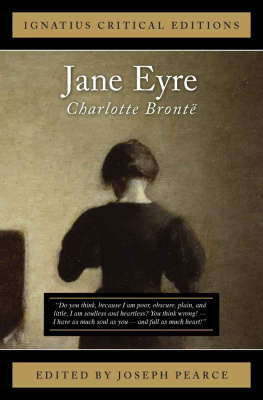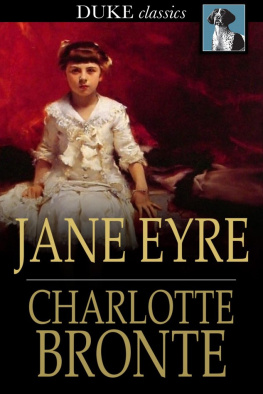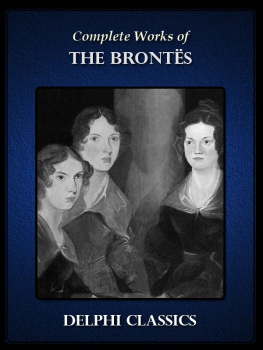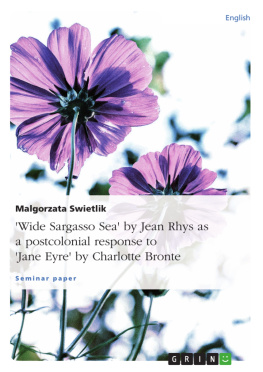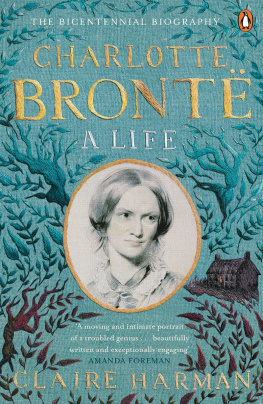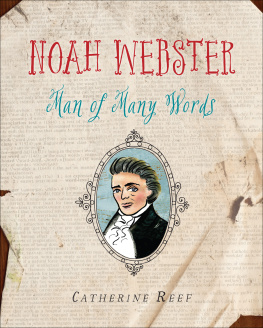Charlotte Brontë - Jane Eyre (Movie Tie-in Edition)
Here you can read online Charlotte Brontë - Jane Eyre (Movie Tie-in Edition) full text of the book (entire story) in english for free. Download pdf and epub, get meaning, cover and reviews about this ebook. year: 2011, publisher: Vintage, genre: Art. Description of the work, (preface) as well as reviews are available. Best literature library LitArk.com created for fans of good reading and offers a wide selection of genres:
Romance novel
Science fiction
Adventure
Detective
Science
History
Home and family
Prose
Art
Politics
Computer
Non-fiction
Religion
Business
Children
Humor
Choose a favorite category and find really read worthwhile books. Enjoy immersion in the world of imagination, feel the emotions of the characters or learn something new for yourself, make an fascinating discovery.

- Book:Jane Eyre (Movie Tie-in Edition)
- Author:
- Publisher:Vintage
- Genre:
- Year:2011
- Rating:4 / 5
- Favourites:Add to favourites
- Your mark:
- 80
- 1
- 2
- 3
- 4
- 5
Jane Eyre (Movie Tie-in Edition): summary, description and annotation
We offer to read an annotation, description, summary or preface (depends on what the author of the book "Jane Eyre (Movie Tie-in Edition)" wrote himself). If you haven't found the necessary information about the book — write in the comments, we will try to find it.
Jane Eyre (Movie Tie-in Edition) — read online for free the complete book (whole text) full work
Below is the text of the book, divided by pages. System saving the place of the last page read, allows you to conveniently read the book "Jane Eyre (Movie Tie-in Edition)" online for free, without having to search again every time where you left off. Put a bookmark, and you can go to the page where you finished reading at any time.
Font size:
Interval:
Bookmark:
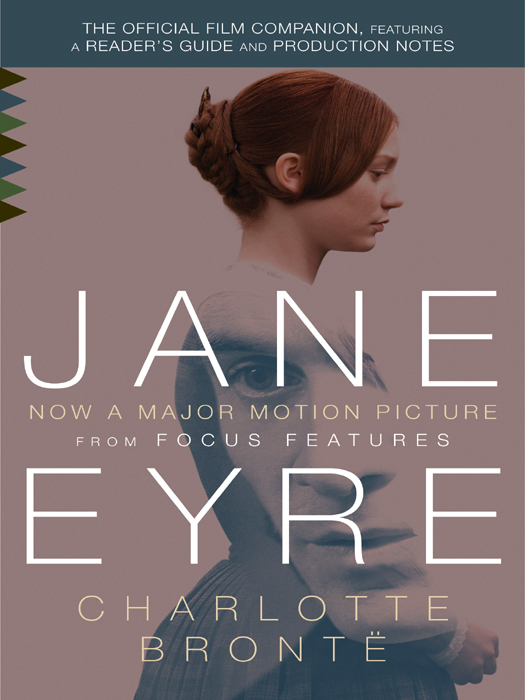
Jane Eyre
The daughter of a Yorkshire clergyman, Charlotte Bront (18161855) worked as a teacher and a governess and first published her poetry under a pseudonym, along with her sisters Emily and Anne. In 1847 the three sisters each published a first novel, again under their pseudonyms, and achieved instant success. Charlottes identity as the author of Jane Eyre was eventually revealed, and she went on to produce three more novels, Villette, Shirley, and The Professor, before dying of pregnancy complications shortly after her marriage.
ALSO BY CHARLOTTE BRONT
Shirley
Villette
The Professor
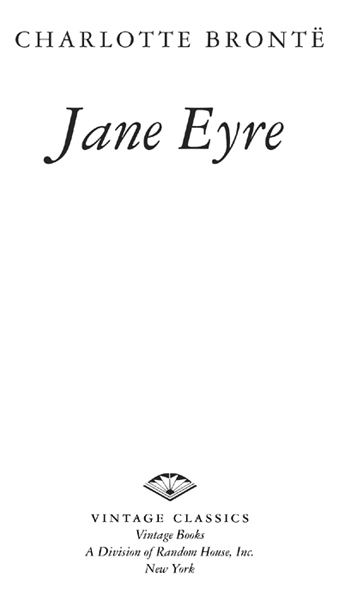
FIRST VINTAGE CLASSICS EDITION, APRIL 2009
All rights reserved. Published in the United States by Vintage Books, a division of Random House, Inc., New York, and in Canada by Random House of Canada Limited, Toronto.
Vintage is a registered trademark and Vintage Classics and colophon are trademarks of Random House, Inc.
The Library of Congress has cataloged the Everymans Library edition as follows:
Bront, Charlotte. 18161855.
Jane Eyre / Charlotte Bront.
I. Title.
PR4167.J3 1991 91-52968
823.8dc20
eISBN: 978-0-307-74497-5
www.vintagebooks.com
Cover photograph: Barbara Wolkoff / Art + Commerce
Design by Megan Wilson
v3.1
A preface to the first edition of Jane Eyre being unnecessary, I gave none: this second edition demands a few words both of acknowledgment and miscellaneous remark.
My thanks are due in three quarters.
To the Public, for the indulgent ear it has inclined to a plain tale with few pretensions.
To the Press, for the fair field its honest suffrage has opened to an obscure aspirant.
To my Publishers, for the aid their tact, their energy, their practical sense, and frank liberality have afforded an unknown and unrecommended Author.
The Press and the Public are but vague personifications for me, and I must thank them in vague terms; but my Publishers are definite: so are certain generous critics who have encouraged me as only large-hearted and high-minded men know how to encourage a struggling stranger; to them, i.e. to my Publishers and the select Reviewers, I say cordially, Gentlemen, I thank you from my heart.
Having thus acknowledged what I owe those who have aided and approved me, I turn to another class; a small one, so far as I know, but not, therefore, to be overlooked. I mean the timorous or carping few who doubt the tendency of such books as Jane Eyre: in whose eyes whatever is unusual is wrong; whose ears detect in each protest against bigotry that parent of crime an insult to piety, that regent of God on earth. I would suggest to such doubters certain obvious distinctions; I would remind them of certain simple truths.
Conventionality is not morality. Self-righteousness is not religion. To attack the first is not to assail the last. To pluck the mask from the face of the Pharisee, is not to lift an impious hand to the Crown of Thorns.
These things and deeds are diametrically opposed: they are as distinct as is vice from virtue. Men too often confound them; they should not be confounded: appearance should not be mistaken for truth; narrow human doctrines, that only tend to elate and magnify a few, should not be substituted for the world-redeeming creed of Christ. There is I repeat it a difference; and it is a good, and not a bad action to mark broadly and clearly the line of separation between them.
The world may not like to see these ideas dissevered, for it has been accustomed to blend them; finding it convenient to make external show pass for sterling worth to let white-washed walls vouch for clean shrines. It may hate him who dares to scrutinize and expose to raise the gilding, and show base metal under it to penetrate the sepulchre, and reveal charnel relics: but hate as it will, it is indebted to him.
Ahab did not like Micaiah, because he never prophesied good concerning him, but evil: probably he liked the sycophant son of Chenaannah better; yet might Ahab have escaped a bloody death, had he but stopped his ears to flattery, and opened them to faithful counsel.
There is a man in our own days whose words are not framed to tickle delicate ears: who, to my thinking, comes before the great ones of society, much as the son of Imlah came before the throned Kings of Judah and Israel; and who speaks truth as deep, with a power as prophet-like and as vital a mien as dauntless and as daring. Is the satirist of Vanity Fair admired in high places? I cannot tell; but I think if some of those amongst whom he hurls the Greek fire of his sarcasm, and over whom he flashes the levin-brand of his denunciation, were to take his warnings in time they or their seed might yet escape a fatal Ramoth-Gilead.
Why have I alluded to this man? I have alluded to him, Reader, because I think I see in him an intellect profounder and more unique than his contemporaries have yet recognised; because I regard him as the first social regenerator of the day as the very master of that working corps who would restore to rectitude the warped system of things; because I think no commentator on his writings has yet found the comparison that suits him, the terms which rightly characterize his talent. They say he is like Fielding: they talk of his wit, humour, comic powers. He resembles Fielding as an eagle does a vulture: Fielding could stoop on carrion, but Thackeray never does. His wit is bright, his humour attractive, but both bear the same relation to his serious genius, that the mere lambent sheet-lightning playing under the edge of the summer-cloud, does to the electric death-spark hid in its womb. Finally; I have alluded to Mr Thackeray, because to him if he will accept the tribute of a total stranger I have dedicated this second edition of J ANE E YRE .
Dec. 21st, 1847.
CURRER BELL
NOTE
[TO THE THIRD EDITION]
I avail myself of the opportunity which a third edition of Jane Eyre affords me, of again addressing a word to the public, to explain that my claim to the title of novelist rests on this one work alone. If, therefore, the authorship of other works of fiction has been attributed to me, an honour is awarded where it is not merited; and consequently, denied where it is justly due.
This explanation will serve to rectify mistakes which may already have been made, and to prevent future errors.
April 13th, 1848.
CURRER BELL
TO
W. M. THACKERAY, Esq.
THIS WORK
IS RESPECTFULLY INSCRIBED,
BY
THE AUTHOR
[DEDICATION OF THE SECOND EDITION]
CHAPTER I
T HERE was no possibility of taking a walk that day. We had been wandering, indeed, in the leafless shrubbery an hour in the morning; but since dinner (Mrs Reed, when there was no company, dined early) the cold winter wind had brought with it clouds so sombre, and a rain so penetrating, that further out-door exercise was now out of the question.
I was glad of it: I never liked long walks, especially on chilly afternoons: dreadful to me was the coming home in the raw twilight, with nipped fingers and toes, and a heart saddened by the chidings of Bessie, the nurse, and humbled by the consciousness of my physical inferiority to Eliza, John, and Georgiana Reed.
Font size:
Interval:
Bookmark:
Similar books «Jane Eyre (Movie Tie-in Edition)»
Look at similar books to Jane Eyre (Movie Tie-in Edition). We have selected literature similar in name and meaning in the hope of providing readers with more options to find new, interesting, not yet read works.
Discussion, reviews of the book Jane Eyre (Movie Tie-in Edition) and just readers' own opinions. Leave your comments, write what you think about the work, its meaning or the main characters. Specify what exactly you liked and what you didn't like, and why you think so.

